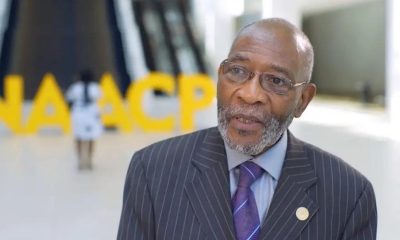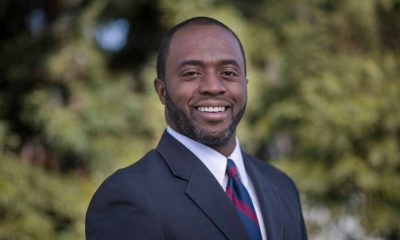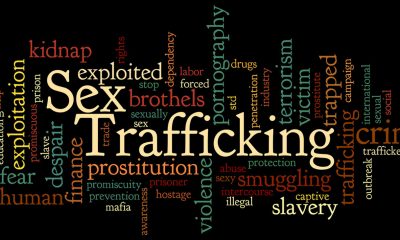Black History
While Some Minority Students and Teachers Thrive in Distant Learning, Others Struggle Daily
NNPA NEWSWIRE — “There’s a bunch of research about the value add of Black teachers in school. It turns out that Black teachers help all students to perform better,” says Sekou Biddle, the Vice President of Advocacy and Student Professional Development Programs at the United Negro College Fund. “White students perform better too. When Black people do well, everyone does well. The problem is that when others do well without us doing well, they leave us behind,” concluded Biddle, who leads advocacy efforts to ensure that more African American students will be college-ready and better prepared to enroll in and complete college.

By Stacy M. Brown, NNPA Newswire Senior National Correspondent
@StacyBrownMedia
Sponsored by the Bill and Melinda Gates Foundation, the NNPA continues its campaign to raise awareness about education barriers for students of color and help bridge the learning gap for minorities, especially during the coronavirus pandemic.
In a series of interviews with Dr. Edwards-Jones and other educators and community stakeholders, the NNPA hopes to push the importance of bridging the education gap and digital divide that has long proven challenging for minority students.
Dr. Peggy Edwards-Jones has spent much of the past two decades as a principal at the Friendship Collegiate Academy Early College Campus in the Northeast section of Washington, D.C.
Incoming freshman at Friendship Collegiate Academy are referred to as scholars.
And with good reason.
In an interview with National Newspaper Publishers Association (NNPA) President and CEO, Dr. Benjamin F. Chavis Jr., Dr. Edwards-Jones relayed what she called her proudest moments in education thus far.
Those moments include graduating over 3,500 scholars, with a 100 percent acceptance rate to a college or university. Some of her scholars graduate with one to two years of college courses completed before leaving high school.
At least 80 percent of those scholars who graduated completed their first year of college. Ninety-nine percent of the students are African American or individuals of color.
“The biggest issue for minority students is an opportunity,” Dr. Edward-Jones offered.
“At our campus, students can select majors like science, engineering, and computer science and take courses toward graduation,” Dr. Edwards-Jones added.
Dr. Edwards-Jones sits on several boards and committees, including the National Save Our Schools Coalition, the American Federation of Teachers Program and Policy Council, D.C. Community School Task Force, and the Advisory Panel to the National Commission on Writing in America’s Schools.
“The overall goal is to make sure that the students are college-ready, so we give them college courses. The biggest thing we have found across the country is access,” Dr. Edwards-Jones posited.
Other professionals noted that access for the underserved is vital.
“We can see our students prevail with access, just like any other groups across the country.”
“Black children need to hear about and learn about Black excellence, not as a set of exceptional stories, but that these are happening every single day,” said Sekou Biddle, the Vice President of Advocacy and Student Professional Development Programs at the United Negro College Fund (UNCF).
“The thing that people miss is the importance of Black educators,” Biddle offered further.
“There’s a bunch of research about the value add of Black teachers in school. It turns out that Black teachers help all students to perform better,” he pronounced.
“White students perform better too. When Black people do well, everyone does well. The problem is that when others do well without us doing well, they leave us behind,” concluded Biddle, who leads advocacy efforts to ensure that more African American students will be college-ready and better prepared to enroll in and complete college.
Biddle manages UNCF’s advocacy platform, including three major components: grass-tops partnerships, grassroots engagement, and messaging and research.
Elizabeth A. Davis, the new president of the Washington Teachers’ Union (WTU), told the NNPA that the pandemic had magnified the digital divide.
“The digital divide is not new, and I am familiar with a lot of the inequities that have existed in D.C. public schools,” Davis noted.
She has helped transform the WTU into a social justice, solution-driven organization dedicated to advancing and promoting quality education for all children regardless of their zip codes or results of a school lottery.
“The pandemic has pulled back the covers on a lot of these inequities, and they’ve been glaring,” Davis added.
“I refer to the achievement gap as the ‘opportunity gap’ because the achievement gap goes to capacity to learn.”
“In our students, I have not met a student in my 40 years of teaching that did not have the capacity to reach whatever bar I set for them. What I have noticed is that the opportunity to learn for African American students, not only in the District but throughout the country, has not been there.”
Davis said the inequities in education must be addressed in meaningful ways.
“We can’t exclude poverty and homelessness,” Davis proclaimed.
“We have 6,000 students in our public school system in D.C. that report to school from homeless shelters. It is going to take a heavy lift and a deep amount of understanding. We cannot overlook the fact that our students, Black and Brown students, have been trying to catch up, and collaboration is key to that. It’s quite critical.”
Finally, Davis offered that teachers also require support.
“In mid-March when teachers had to transition very quickly from brick-and-mortar teaching to distant teaching, they did so in five days with no professional training,” Davis recalled.
“We know we will be in a hybrid model of teaching for some time, so we need to get distance learning right. The first step is closing the digital divide,” she said.
“We want each student to have one-to-one devices, and we need to talk about preparing our teachers with sustained and ongoing professional development that not only help them develop the know-how to use the digital platforms but the know-how to transition to vigorous and well-rounded content.”
Activism
S.F. Black Leaders Rally to Protest, Discuss ‘Epidemic’ of Racial Slurs Against Black Students in SF Public School System
Parents at the meeting spoke of their children as no longer feeling safe in school because of bullying and discrimination. Parents also said that reported incidents such as racial slurs and intimidation are not dealt with to their satisfaction and feel ignored.

By Carla Thomas
San Francisco’s Third Baptist Church hosted a rally and meeting Sunday to discuss hatred toward African American students of the San Francisco Unified School District (SFUSD).
Rev. Amos C. Brown, president of the San Francisco NAACP and pastor of Third Baptist Church, along with leadership from local civil rights groups, the city’s faith-based community and Black community leadership convened at the church.
“There has been an epidemic of racial slurs and mistreatment of Black children in our public schools in the city,” said Brown. “This will not be tolerated.”
According to civil rights advocate Mattie Scott, students from elementary to high school have reported an extraordinary amount of racial slurs directed at them.
“There is a surge of overt racism in the schools, and our children should not be subjected to this,” said Scott. “Students are in school to learn, develop, and grow, not be hated on,” said Scott. “The parents of the children feel they have not received the support necessary to protect their children.”
Attendees were briefed last Friday in a meeting with SFUSD Superintendent Dr. Matt Wayne.
SFUSD states that their policies protect children and they are not at liberty to publicly discuss the issues to protect the children’s privacy.
Parents at the meeting spoke of their children as no longer feeling safe in school because of bullying and discrimination. Parents also said that reported incidents such as racial slurs and intimidation are not dealt with to their satisfaction and feel ignored.
Some parents said they have removed their students from school while other parents and community leaders called on the removal of the SFUSD superintendent, the firing of certain school principals and the need for more supportive school board members.
Community advocates discussed boycotting the schools and creating Freedom Schools led by Black leaders and educators, reassuring parents that their child’s wellbeing and education are the highest priority and youth are not to be disrupted by racism or policies that don’t support them.
Virginia Marshall, chair of the San Francisco NAACP’s education committee, offered encouragement to the parents and students in attendance while also announcing an upcoming May 14 school board meeting to demand accountability over their mistreatment.
“I’m urging anyone that cares about our students to pack the May 14 school board meeting,” said Marshall.
This resource was supported in whole or in part by funding provided by the State of California, administered by the California State Library via California Black Media as part of the Stop the Hate Program. The program is supported by partnership with California Department of Social Services and the California Commission on Asian and Pacific Islander American Affairs as part of the Stop the Hate program. To report a hate incident or hate crime and get support, go to CA vs Hate.
Activism
Oakland Post: Week of May 1 – 7, 2024
The printed Weekly Edition of the Oakland Post: Week of May 1 – 7, 2024

To enlarge your view of this issue, use the slider, magnifying glass icon or full page icon in the lower right corner of the browser window. ![]()
Activism
Oakland Post: Week of April 24 – 30, 2024
The printed Weekly Edition of the Oakland Post: Week of April 24 – 30, 2024

To enlarge your view of this issue, use the slider, magnifying glass icon or full page icon in the lower right corner of the browser window. ![]()
-

 Community3 weeks ago
Community3 weeks agoFinancial Assistance Bill for Descendants of Enslaved Persons to Help Them Purchase, Own, or Maintain a Home
-

 Business3 weeks ago
Business3 weeks agoV.P. Kamala Harris: Americans With Criminal Records Will Soon Be Eligible for SBA Loans
-

 City Government4 days ago
City Government4 days agoCourt Throws Out Law That Allowed Californians to Build Duplexes, Triplexes and RDUs on Their Properties
-

 Activism4 weeks ago
Activism4 weeks agoOakland Post: Week of April 10 – 16, 2024
-

 Activism2 weeks ago
Activism2 weeks agoOakland Post: Week of April 24 – 30, 2024
-

 Community3 weeks ago
Community3 weeks agoAG Bonta Says Oakland School Leaders Should Comply with State Laws to Avoid ‘Disparate Harm’ When Closing or Merging Schools
-

 Community3 weeks ago
Community3 weeks agoRichmond Nonprofit Helps Ex-Felons Get Back on Their Feet
-

 Community3 weeks ago
Community3 weeks agoOakland WNBA Player to be Inducted Into Hall of Fame





















































